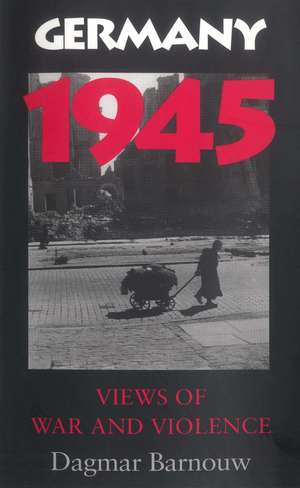Germany 1945 – Views of War and Violence
Autor Dagmar Barnouwen Limba Engleză Paperback – 27 aug 2008
Preț: 174.52 lei
Nou
Puncte Express: 262
Preț estimativ în valută:
33.39€ • 34.87$ • 27.64£
33.39€ • 34.87$ • 27.64£
Carte disponibilă
Livrare economică 14-28 martie
Preluare comenzi: 021 569.72.76
Specificații
ISBN-13: 9780253220431
ISBN-10: 0253220432
Pagini: 280
Ilustrații: 128 b&w photographs
Dimensiuni: 178 x 254 x 15 mm
Greutate: 0.59 kg
Editura: MH – Indiana University Press
ISBN-10: 0253220432
Pagini: 280
Ilustrații: 128 b&w photographs
Dimensiuni: 178 x 254 x 15 mm
Greutate: 0.59 kg
Editura: MH – Indiana University Press
Cuprins
List of IllustrationsIntroduction: Views of War and Violence; 1. Views of the Past: Memory and Historical Evidence; 2. To Make Them See: Photography, Identification, and Identity; 3. The Quality of Citory and the German Question: The Signal Corps Photography Album and Life Photo-Essays; 4. What They Saw: Germany 1945 and Allied Photographers; 5. Words and Images: German QuestionsNotes; Index
Recenzii
"Germany 1945 is best seen as a contribution to [the] debate . . . about the uniqueness or otherwise of Nazi crimes, and the related questions of collective responsibility for those crimes, and the need to go on remembering them." Times Literary Supplement"[Barnouw's] work shows that perspective plays a key role both in photography and in trying to master Germany's past. Fascinating." Library Journal"Resist the impulse to 'historicize' the Holocaust . . . and you run the danger of sacralizing it. Barnouw's effort to grapple with these dilemmas is provocative, brilliant, and unsettling." Washington Times [Barnouw] leaves no doubt that understanding postwar Germany must also involve remembering how Germans were seen and saw themselves after the defeat of National Socialism. German History Packed with carefully chosen photos of the concentration camps, German exiles, the war-injured, children, and bombed-out cities, this book is a moving reminder of the material and moral devastation left behind by Nazi Germany. Rudy KosharA serious, well-written addition to the current discussion of Germanys memory. Choice
"Germany 1945 is best seen as a contribution to [the] debate ... about the uniqueness or otherwise of Nazi crimes, and the related questions of collective responsibility for those crimes, and the need to go on remembering them." Times Literary Supplement "[Barnouw's] work shows that perspective plays a key role both in photography and in trying to master Germany's past. Fascinating." Library Journal "Resist the impulse to 'historicize' the Holocaust ... and you run the danger of sacralizing it. Barnouw's effort to grapple with these dilemmas is provocative, brilliant, and unsettling." Washington Times "[Barnouw] leaves no doubt that understanding postwar Germany must also involve remembering how Germans were seen and saw themselves after the defeat of National Socialism." German History "Packed with carefully chosen photos of the concentration camps, German exiles, the war-injured, children, and bombed-out cities, this book is a moving reminder of the material and moral devastation left behind by Nazi Germany." Rudy Koshar "A serious, well-written addition to the current discussion of Germany's memory." Choice
"Germany 1945 is best seen as a contribution to [the] debate ... about the uniqueness or otherwise of Nazi crimes, and the related questions of collective responsibility for those crimes, and the need to go on remembering them." Times Literary Supplement "[Barnouw's] work shows that perspective plays a key role both in photography and in trying to master Germany's past. Fascinating." Library Journal "Resist the impulse to 'historicize' the Holocaust ... and you run the danger of sacralizing it. Barnouw's effort to grapple with these dilemmas is provocative, brilliant, and unsettling." Washington Times "[Barnouw] leaves no doubt that understanding postwar Germany must also involve remembering how Germans were seen and saw themselves after the defeat of National Socialism." German History "Packed with carefully chosen photos of the concentration camps, German exiles, the war-injured, children, and bombed-out cities, this book is a moving reminder of the material and moral devastation left behind by Nazi Germany." Rudy Koshar "A serious, well-written addition to the current discussion of Germany's memory." Choice
Notă biografică
Dagmar Barnouw
Descriere
Stunning documentary photographs are the focus of this compelling study of postwar Germany and the battle over history, memory, and the German past.




